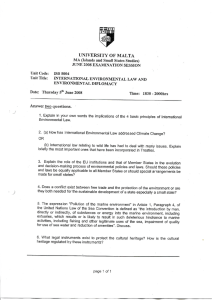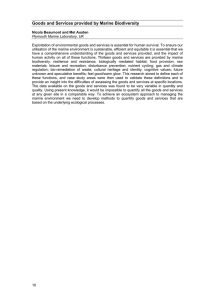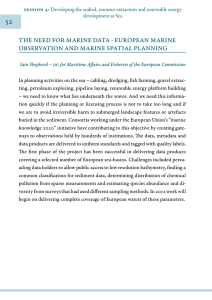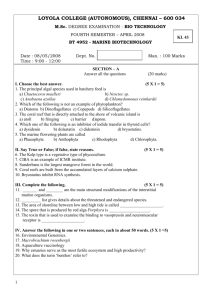12/7/2012 Marine Biotechnology the use of organisms or their components to provide goods or services
advertisement
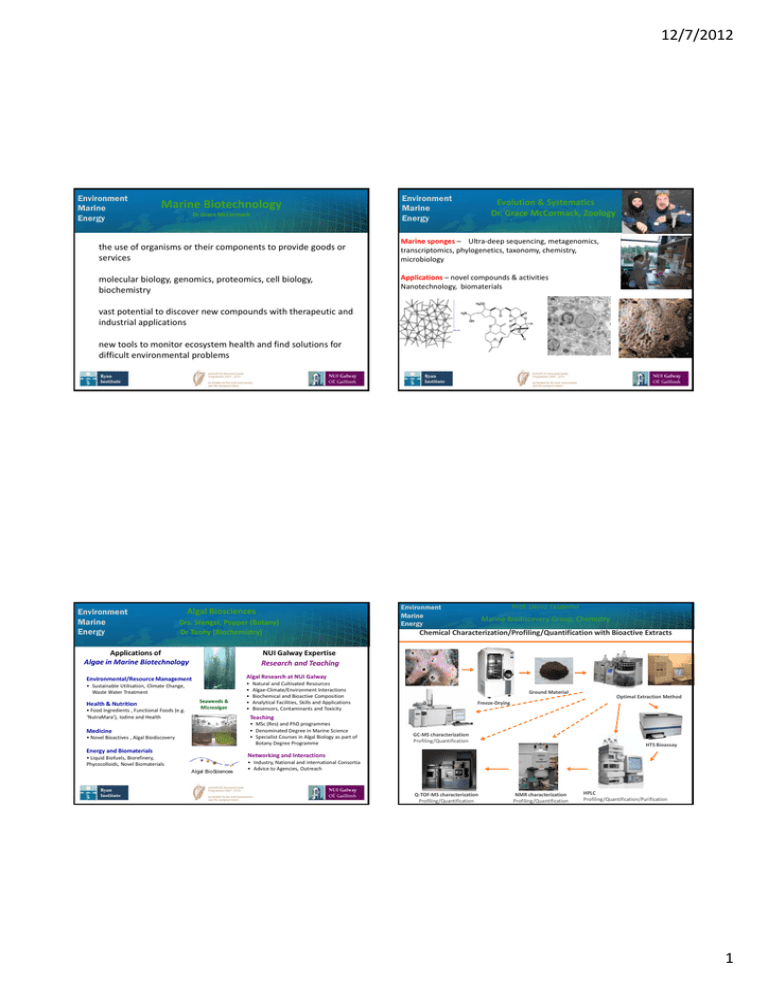
12/7/2012 Environment Marine Energy Marine Biotechnology Dr Grace McCormack Environment Marine Energy Evolution & Systematics Dr. Grace McCormack, Zoology the use of organisms or their components to provide goods or services Marine sponges – Ultra‐deep sequencing, metagenomics, transcriptomics, phylogenetics, taxonomy, chemistry, microbiology molecular biology, genomics, proteomics, cell biology, biochemistry Applications – novel compounds & activities gy, Nanotechnology, biomaterials vast potential to discover new compounds with therapeutic and industrial applications new tools to monitor ecosystem health and find solutions for difficult environmental problems Environment Marine Energy Algal Biosciences Drs. Stengel, Popper (Botany) Dr Tuohy (Biochemistry) Applications of Algae in Marine Biotechnology Chemical Characterization/Profiling/Quantification with Bioactive Extracts Algal Research at NUI Galway • Sustainable Utilisation, Climate Change, Waste Water Treatment • Food Ingredients , Functional Foods (e.g. ‘NutraMara’), Iodine and Health Marine Biodiscovery Group, Chemistry NUI Galway Expertise Research and Teaching Environmental/Resource Management Health & Nutrition Health & Nutrition Prof. Deniz Tasdemir Environment Marine Energy Seaweeds & Microalgae • • • • • Natural and Cultivated Resources Algae‐Climate/Environment Interactions Biochemical and Bioactive Composition Analytical Facilities Skills and Applications Analytical Facilities, Skills and Applications Biosensors, Contaminants and Toxicity Ground Material Optimal Extraction Method Freeze‐Drying Teaching • MSc (Res) and PhD programmes • Denominated Degree in Marine Science • Specialist Courses in Algal Biology as part of Botany Degree Programme Medicine • Novel Bioactives , Algal Biodiscovery Energy and Biomaterials GC‐MS characterization Profiling/Quantification HTS Bioassay Networking and Interactions • Liquid Biofuels, Biorefinery, Phycocolloids, Novel Biomaterials Algal BioSciences • Industry, National and international Consortia • Advice to Agencies, Outreach Q‐TOF‐MS characterization Profiling/Quantification NMR characterization Profiling/Quantification HPLC Profiling/Quantification/Purification 1 12/7/2012 Environment Marine Energy Environment Marine Energy Microbial Oceanography Research Group Dr. Gerard Fleming, Microbiology • Deep‐sea microorganisms • Cultures of deep‐sea water and sediment under conditions of in‐situ pressure • Chemostat culture for enrichment / selection of deep‐sea microorganisms with biotechnological potential (antimicrobial activity / degradation of xenobiotic materials etc. ) Environment Marine Energy Carna Research Station • Relevant Project portfolio • EIRCOD – Cod breeding & Broodstock • Energetic Algae • Salmonid Diets & Seaweeds • Finfish Waste Utilisation • Climate Change : Seaweeds & Fish Marine Ecology Dr. Anne Marie Power, Zoology natural ‘glue’ proteins evolved to achieve ‘wet adhesion’ characterise and apply 2

